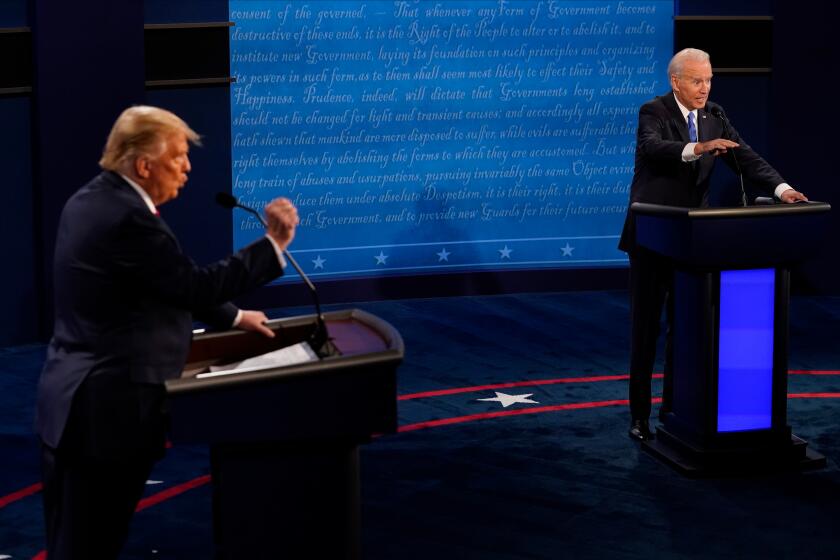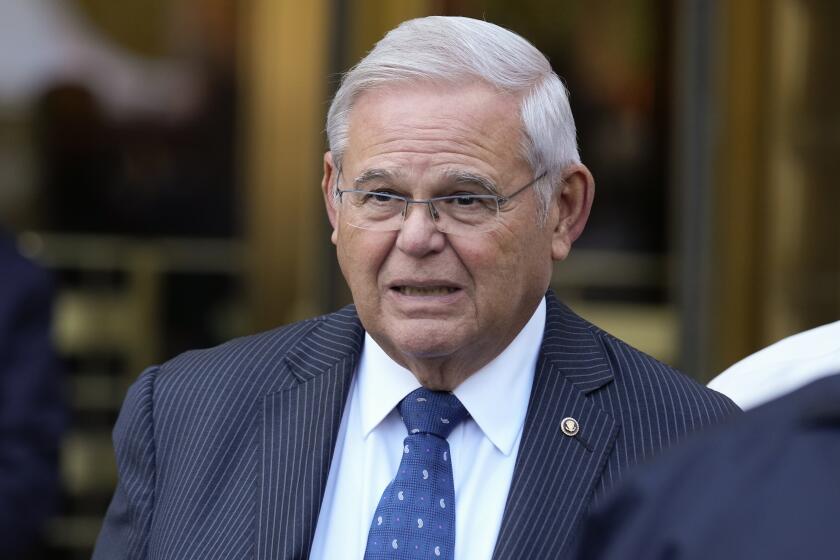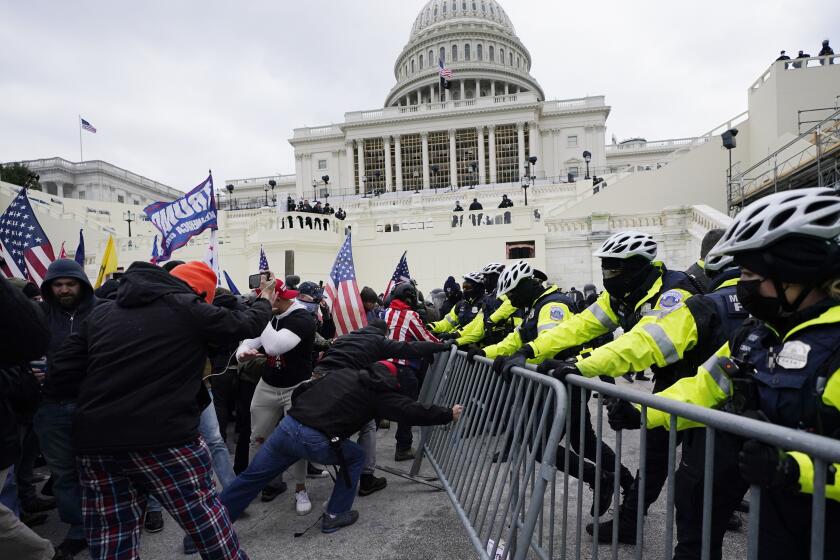Tsongas Is Learning That Image Counts : Politics: He is a self-deprecating regular guy who admits to a high school nickname of ‘Tsongie Bongie.’ And he wears presidential red ties.
He wears telegenic blue shirts. His new suits have shoulder pads. He dons--ugh--presidential red striped ties. Paul E. Tsongas, the un-candidate, has adopted many of the mannerisms of the slick, mediagenic fellows he routinely skewers as he stumps across America.
The other day, as the Democratic presidential candidate strode through Georgia’s capital with a gaggle of television cameras in pursuit, an aide approached a score of black fifth-graders to suggest that they give the candidate high-fives as he came by.
They did, and the cameras whirred appreciatively.
Later, Tsongas nibbled at a venerable rib joint, visited the offices where Dr. Martin Luther King Jr. organized the civil rights struggle and laid a wreath at King’s grave--saying little, until asked, about how he would address the concerns of the black population, which makes up a goodly chunk of the Georgia electorate.
All of the candidates do this, of course, but Tsongas does it while simultaneously lampooning the “pandering” engaged in by his Democratic colleagues. As the former Massachusetts senator strives to be taken seriously as a long-term contender, he is ever more becoming an artful practitioner of what might be called nerd politics.
His campaign shifts in the blink of an eye from spiritual remonstrations to photo opportunities. Loose enough to confess that his high school nickname was “Tsongie Bongie,” he is also canny enough to use his persona to define his competitors as too slick to trust. To watch him portray it, Tsongas is the high school geek who knew more about slide rules than social graces, and, suddenly, unexpectedly, finds himself going to the prom.
Today, Tsongas arrives in Los Angeles for three fund-raisers and a meeting with Mayor Tom Bradley, events which mark his first foray into Southern California since his announcement last spring. The events, campaign officials said, demonstrate a widening appeal for the man derided until his New Hampshire primary victory as a presidential also-ran.
“Some people say I’m just another charismatic pretty face,” Tsongas, deadpan, told several hundred rapturous fans at a Boston fund-raiser last weekend. “They’re damn right.”
The audience hooted, as always, for Paul Tsongas is his own best target. Take his proposed monologue for “Saturday Night Live,” as practiced on his campaign plane while it idles on the Tarmac in South Dakota:
“I’ve never seen this program before, because I have an active social life. The only people who are home on Saturday night? Not my kind of people. I mean, think about it. You think Warren Beatty’s watching this program?”
Hear that in Tsongas’ mournful cadences, coming out of his beagle-eyed face, and it is genuinely funny. Real or deliberate or a little of both, his self-deprecating regular guy image is helping Tsongas tremendously as he seeks to broaden his support beyond his New England base.
“He seems more credible to me,” said psychologist John York, waiting at the doors of a Rapid City, S.D., diner the other day to shake Tsongas’ hand. “I realize that’s the image he’s presenting, but I hope he stands behind it.”
The Rapid City stop illustrated how the candidate who prides himself on appealing to voters because of a no-nonsense approach to the economy has begun simultaneously to court the television cameras.
That day, he traveled hundreds of miles from Sioux Falls to Rapid City just to shake hands in the diner--no speeches, few references to his economic plan apart from handing voters copies of his booklet “A Call to Economic Arms.”
In terms of pure playing to the cameras, however, the Atlanta visit Wednesday trumped all previous Tsongas forums. “This is a media event,” one cameraman blurted out, surprised, as Tsongas ate a plateful of tasty ribs.
That day, Tsongas made emotional appeals to the Georgia Legislature, emphasizing his working-class background, his service in the Peace Corps and his successful bout with cancer. He met with two scions of the civil rights movement--Martin Luther King III and Ralph David Abernathy III, getting the endorsement of the latter.
Asked by reporters how he could appeal to blacks, Tsongas cited his economic program. He advocates a capital gains tax cut to spur investment in businesses that create jobs, a government spending cap, renewed investment in research and more competitive domestic approach. He derides his competitors as “ATM Democrats,” who seek to take money from the economy without replenishing its supply.
“When I talk about unity and healing, I mean it,” he added. “At some point everybody’s going to have to understand that we’re in this together.”
But as he walked from the grave site of slain civil rights leader King, Tsongas could not say how many of his senior campaign aides were black.
“My whole policy from the very beginning . . . was to have a staff that was inclusive, when I was in the Senate and this campaign as well,” he said.
A Tsongas spokesman said Thursday that of the 10 to 15 senior campaign aides, one--national field director Phil Stanley--is black.
In that regard, Tsongas is probably no different from most of the major candidates of this or past years, who tend to have staffs like themselves--male and white.
But Tsongas is moving from a no-name to a national figure on the strength of his integrity and his moral distance from glad-handing politicians, and anything that smacks of politics as usual can come as a particular jolt.
More to Read
Get the L.A. Times Politics newsletter
Deeply reported insights into legislation, politics and policy from Sacramento, Washington and beyond. In your inbox three times per week.
You may occasionally receive promotional content from the Los Angeles Times.







